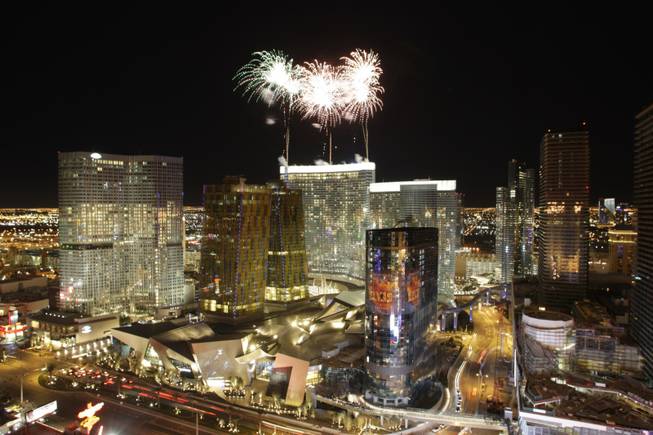
Fireworks explode over the Aria hotel-casino during the official opening Wednesday, Dec. 16, 2009.
Monday, July 19, 2010 | 2 a.m.
BABY BOOMERS GO BUST
Strip gaming renenue is down, and analysts say Baby Boomers and retirees, hit hard by the recession, are partly to blame. Gamblers over age 50 are casinos’ largest customer group, but their money is tied up in homes that have lost equity. Their financial insecurity has quelled their gambling.
Sun Coverage
Strip gaming revenue is struggling to recover despite several indications that the nation’s economic picture has improved somewhat from a year ago.
Revenue fell 6.4 percent in May compared with a year ago and was down 1.3 percent for the 12 months ending May 31 compared with the year-earlier period, the Gaming Control Board reported this month.
Those figures include gaming revenue from CityCenter’s Aria, which opened in December. Without Aria, which boosted overall revenue on the Strip, the rest of the resort corridor fared worse, according to recent estimates from gaming analysts at CB Richard Ellis.
Using an apples to apples comparison, Strip gaming revenue plummeted 14 percent in May compared with a year ago and is down 3.2 percent year to date compared with the same period last year among properties open a year ago, analysts Jacob Oberman and Brent Pirosch say.
The explanation for these sluggish figures lies with Baby Boomers and retirees — the casino industry’s chief customers, they say.
Most gamblers are over 50 because they have more money to spend than younger generations and more time, either because of retirement or because children are no longer living at home.
Casinos face a worsening trend among the customers who helped finance the industry’s biggest growth years: Many older people don’t have enough cash for retirement.
The improving job picture hasn’t helped retirees, while stock gains over the past year have not had as significant an effect on casino spending as home prices, the analysts say. Nor have many retirees, their money tied up in homes that have lost equity in the recession, saved enough for retirement, they say.
During the boom years, many Americans used their homes like ATMs, withdrawing equity to spend on luxury goods and trips. Much of this ready cash has dried up in the recession, and declining home prices have made consumers feel less financially secure and more tight with their cash, analysts say.
“Recent retirees have had to reset their consumption expectations (if they have been able to retire at all), and as such their gambling spending habits could be negatively impacted for years to come,” the CB Richard Ellis report says.
Without a major increase in home prices — the single factor accounting for a large chunk of retiree wealth — a significant rebound in gaming revenue isn’t in the cards, it concludes.
CB Richard Ellis isn’t the first to note some headwinds to an industry recovery. In a June report, Deutsche Bank bond analyst Andrew Zarnett said the recovery will take longer than expected, in part because of nationwide job weakness, job and benefit cuts by cash-strapped state governments and higher federal taxes on various money sources such as income, capital gains and dividends coming on line next year.
The CB Richard Ellis report, focusing on the Baby Boomer “sweet spot” for casinos, cites a 2010 Del Webb survey of Boomers showing that 50-year-olds today have less money saved than in 1996, yet will need more for retirement. The study found that 41 percent of 50-year-olds said they will never be financially prepared for retirement compared with 15 percent who said they would never be prepared for retirement in 1996.
Similarly, the Employee Benefit Research Institute Retirement Confidence Survey this year found 46 percent of workers were “not confident” or “not too confident” they would have enough money in retirement. That compares with 44 percent who lacked confidence in 2009 and 31 percent in 2006.
“Although a partial explanation for this is that people are retiring at an older age, it is clear that many Baby Boomers have to save more of what they are earning to make up for their recent losses in retirement savings,” the CB Richard Ellis analysts say.
If this trend isn’t good for the Strip, the news is worse for smaller casino markets across the country that depend on more frequent visits from older customers, the gaming analysts say. The Strip, which is increasingly attracting younger customers with nongambling activities, is expected to outperform smaller casino markets such as Laughlin and South Florida that depend more on retirees.
On the Strip, casino game revenue is down this year with the exception of baccarat, which has done well because of an influx of Asian high rollers.
Excluding Aria, Strip slot revenue is down 7.2 percent this year compared with the same period last year, CB Richard Ellis says. Table games, excluding baccarat and minibaccarat, fell 10.2 percent by that measure.
Revenue for baccarat and minibaccarat, however, is up 22.5 percent this year compared with the same period a year ago.
That’s despite a 50.8 percent drop in baccarat revenue in May when Strip baccarat players were especially lucky. Including Aria, baccarat revenue was down 37.2 percent in May from a year ago, the Control Board said.
The booming baccarat business lifts the income statements of select high-end casinos that cater to high rollers. It isn’t an indicator that the masses are gambling like they used to, however.
There’s a silver lining for casinos, the CB Richard Ellis report concludes. Younger people, who had less to lose when the real estate and stock market collapsed, are less concerned about retirement.
When the employment picture improves, they are likely to return to their normal spending habits more quickly than Baby Boomers and retirees.

Join the Discussion:
Check this out for a full explanation of our conversion to the LiveFyre commenting system and instructions on how to sign up for an account.
Full comments policy